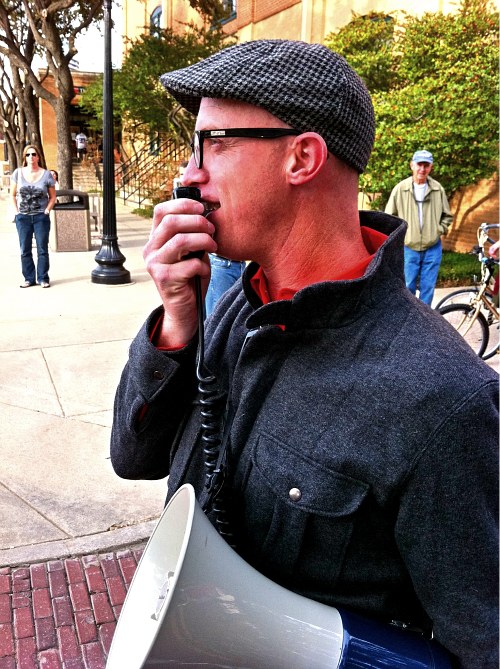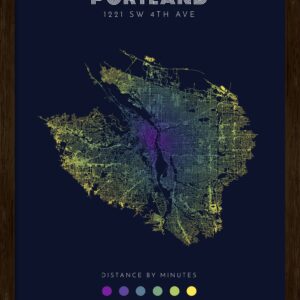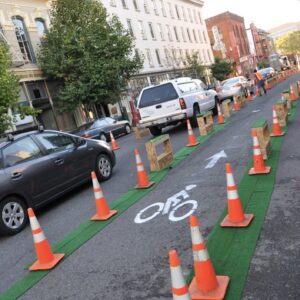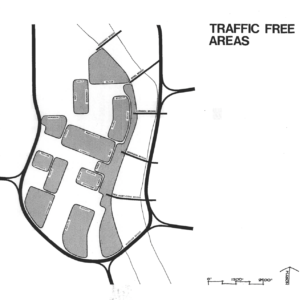If you had to pick a single person to thank for the wave of live on-street demos that’s been spreading rapidly around the country — most recently, today’s pop-up protected bike lane on Southwest Broadway — it’d probably be Jason Roberts.
In 2010, the Dallas-based planner co-created what’s now The Better Block Foundation by raising $1,000 for a semi-legal weekend demo of bike lanes, street flowerpots, cafe seating and pedestrian space in the city’s Oak Cliff neighborhood. From there, Roberts has spun the concept into a group that has lent its name to disciples around the country and last month received a $775,000 grant from the Knight Foundation to enshrine live community-led demos as a legitimate part of American urban planning.
As we wrote on Tuesday, Roberts is visiting Portland this week for a talk at City Hall on Friday. We caught up with him for an interview about how to run a great street demo, how these projects can improve cities and why they were developed in Dallas, of all places.
What brings you to Portland?
“We’re getting a whole different group coming out. A lot of folks who want to stop the planning and discussion, who want to roll up their sleeves and try things.”
— Jason Roberts, Better Block Foundation
I’ve been seeing all the work that’s been going on the Better Block PDX team. We just created our foundation, which launched in early January. The focus is how can we support these open-source Better Blocks happening all over the place — all around the world, actually.
What other cities around the world stand out for using on-street demos?
In Memphis they’ve got a whole initiative called MEMfix that kind of took it to the next level. Norfolk, Virginia — their Better Block has led to the creation of an arts district. We’re working with a lot of people on the ground in Akron, Ohio.
Around the world, I would say Australia has really impressed us. They’re doing projects in Sydney and in Melbourne. We’ve also seen this in Tehran, Iran. I would say it developed in the Anglosphere, but you’re starting to see it reach beyond. In fact, we’re talking to a group in Cape Town, South Africa.
What makes these efforts popular in the cities where they arise?
Memphis or Akron or Norfolk, they have issues like loss of industry, depopulation. You’re seeing this innovation occur from the community because they can’t rely on traditional methods to get things done any more. Now they’re trying to figure out “Wow can we retrofit this? Because we don’t have the industry, we don’t have the population, we don’t have the resources.”
But Portland’s not in that boat — it’s doing really well economically right now, and the population’s been growing fast. Why do you think Better Block has taken root here?
Portland is looked at around the country, the innovative approaches it’s taking to infrastructure. I think Better Block creates a new tool. With PSU and a neighborhood that’s engaged and excited, I think you have this great infrastructure to do a lot of testing.
Advertisement
For me, the most exciting thing about live street demos is that they could make the public process less of an elite thing — the city isn’t getting all its input from the people who have enough time or money to go to meetings. But I don’t actually have any evidence that that’s going on. Do you?
What we have found is we’re getting a whole different group coming out. A lot of folks who want to stop the planning and discussion, who want to roll up their sleeves and try things. We take surveys when we go to our sites; we’re seeing a lot more younger people come out. In the past, they had a hard time getting young people engaged in the public process.
The most impressive Better Block demos, like the one you inspired in Memphis, seem to include a huge amount of buy-in from businesses. Obviously more is better, but what’s the minimum amount of business involvement for a successful Better Block?
Ideally, if I can get a good 50 percent of property owners on board with the initiative, we can have a good solid project. The number we found pretty regularly is a tripling of regular business for the businesses that are there. So afterwards they become a lot stronger allies for the project.
What’s your best tip for getting people to show up for a street demo?
To get as many volunteers as possible to be there for setting it up on the day before. They’re going to be documenting it and tagging it. They’re the ones that are going to be the messengers for the whole community. Documenting well the before and the after — that gets people pretty fired.
What’s the coolest thing you’ve ever seen someone do for a Better Block demo?
A group in Geelong, Australia — they took dumpsters and converted them into parklets.
To the extent that I’m patriotic, it’s probably about the fact that in this country we seem to have an attitude of “That’s not the government’s problem to solve, that’s everyone’s problem, that’s the community’s problem.” Maybe that has something to do with why these demos emerged here, and also do well in Australia?
In Texas where we started this work, there’s a pretty strong libertarian streak. The beautiful thing about Better Block is it became apolitical. Conservatives were like, Okay, there’s businesses being created. And liberals could be like, The people are rising up. And the libertarians could be like, They’re flouting the laws! At that point people were like, Which side are you on?
I get frustrated when people forget that collectively, we are the government. Whenever we make it a “them,” that’s a big part of the problem.
Qs & As edited. Follow Jason on Twitter @mannytmoto
Correction 4:50 p.m.: An earlier version of this post got the wrong name for the site of Roberts’ first project.
— Michael Andersen, (503) 333-7824 – michael@bikeportland.org
BikePortland can’t survive without paid subscribers. Please sign up today.






“I get frustrated when people forget that collectively, we are the government. Whenever we make it a “them,” that’s a big part of the problem.”
Thank you!
What’s the TLDR on Memphis? I mean, what’s happened there that is/was so cool?
Also, Portland is about as advanced as an oil state.
(oil state=iran)
http://betterblock.org/over-10000-people-enjoy-broad-street-better-block/
http://www.peopleforbikes.org/blog/entry/memphis-is-about-to-build-the-countrys-first-crowdfunded-bike-lane
http://www.peopleforbikes.org/blog/entry/the-big-idea-behind-bike-projects-and-the-memphis-rebound
http://memfix.org/
thanks. So what “kind of took it to the next level” appears to be the community involvement/crowdfunding.